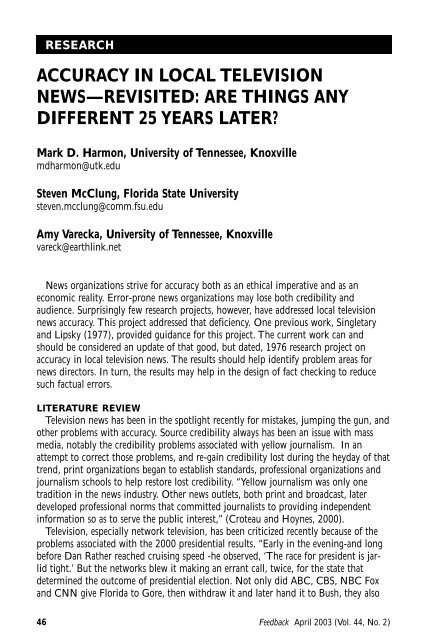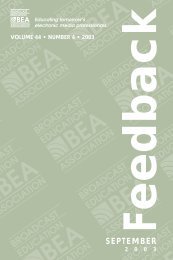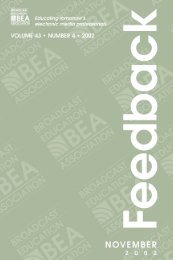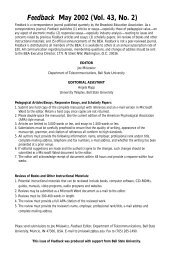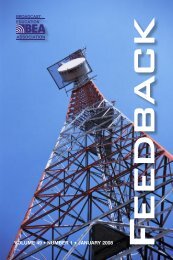RESEARCHACCURACY IN LOCAL TELEVISIONNEWS—REVISITED: ARE THINGS ANYDIFFERENT 25 YEARS LATER?Mark D. Harmon, University of Tennessee, Knoxvillemdharmon@utk.eduSteven McClung, Florida State Universitysteven.mcclung@comm.fsu.eduAmy Varecka, University of Tennessee, Knoxvillevareck@earthlink.netNews organizations strive for accuracy both as an ethical imperative and as aneconomic reality. Error-prone news organizations may lose both credibility andaudience. Surprisingly few research projects, however, have addressed local televisionnews accuracy. This project addressed that deficiency. One previous work, Singletaryand Lipsky (1977), provided guidance for this project. The current work can andshould be considered an update of that good, but dated, 1976 research project onaccuracy in local television news. The results should help identify problem areas fornews directors. In turn, the results may help in the design of fact checking to reducesuch factual errors.LITERATURE REVIEWTelevision news has been in the spotlight recently for mistakes, jumping the gun, andother problems with accuracy. Source credibility always has been an issue with massmedia, notably the credibility problems associated with yellow journalism. In anattempt to correct those problems, and re-gain credibility lost during the heyday of thattrend, print organizations began to establish standards, professional organizations andjournalism schools to help restore lost credibility. “Yellow journalism was only onetradition in the news industry. Other news outlets, both print and broadcast, laterdeveloped professional norms that committed journalists to providing independentinformation so as to serve the public interest,” (Croteau and Hoynes, 2000).Television, especially network television, has been criticized recently because of theproblems associated with the 2000 presidential results. “Early in the evening-and longbefore Dan Rather reached cruising speed -he observed, ‘The race for president is jarlidtight.’ But the networks blew it making an errant call, twice, for the state thatdetermined the outcome of presidential election. Not only did ABC, CBS, NBC Foxand CNN give Florida to Gore, then withdraw it and later hand it to Bush, they also46Feedback April 2003 (Vol. 44, No. 2)
called Florida before the polls closed in the Western Panhandle region of the state, theonly section situated in the Central Time Zone” (McClellan, et.al, 2000).When there are problems with accuracy, credibility suffers bothamong the general public and potential sources. There is usually plenty of blametossed around for the mistakes. Some blame pollsters (Donath, 2001). Often, mistakesare quickly acknowledged, and apologized for near the end of newscasts or some otherinconspicuous point in the show.Part of the problem, both at the local and national level is the streamlining of newsdepartments. Fewer people are asked to do more work. On the local level, many newsoperations have expanded the traditional six-o’clock news into the five-o’clock hourwhile failing to hire additional staff to assist with the larger workload. “As mediamergers continue and Programming Departments and bottom-line business intereststake over news operations, TV News has cut back on reporters, writers, videographersand technicians, and rely more on outside sources for news and videotape. In Januaryof 2001, CBS, ABC, NBC and CNN all announced major staff reductions” (Whitaker,2001).No matter who is to blame or where the blame lies, network television news recentlyhas suffered a loss of credibility at the same time the public is relying and praising localtelevision news. “Local TV newscasts are now the public’s number one source of news,according to a survey by Louis Harris for The Center for Media and Public Affairs. Notonly do they get the biggest ratings, but people also rank them higher in quality andcredibility than network news, local newspapers, or any other news source. That’s scary”(Grossman, 1997). Despite Grossman’s misgivings, three 1998 Roper polls found from68 to 74 percent of respondents believe they can trust the accuracy of the news andinformation they get from local television news in their area (Howard W. OdumInstitute for Research in Social Science Public Opinion Poll Question Database, 2001).Local TV news tends to get fairly good ratings for accuracy in other public opinionpolls. A Los Angeles Times telephone poll of 2,993 persons (Shaw, 1985) found, “Onaccuracy, 50 percent of the general public said their local television news program doesa ‘very good’ job; 39 percent gave that rating to their newspaper and only 37 percentgave it to their network television news program.” On the flip side, only 3 percent saidtheir local TV news program does a bad job on accuracy, 4 percent said their networkTV news program does badly on accuracy, and 7 percent said their newspaper does abad job. A NewsLab survey (Potter and Mitchell, 2001) of 246 working TV journalistsfound substantial concern about accuracy. While 94 percent said it was important toreview daily reporter scripts before they air, only 65 percent said that always occurs.Eight of ten said it was important to review anchor scripts, but only four in ten saidthat always happens. But is either the professional concern or the public trust justified?This research examines accuracy in local television news, by re-visiting a 25year-old study that originally looked at accuracy in local television news. Thetechnique of sending stories to sources for accuracy comments is not new. Charnley(1936) did it with newspaper clippings. Berry (1967) and Brown (1965) borrowedfrom Charnley’s technique to examine further newspaper accuracy. Singletary andLipsky transcribed fifteen early- or late-evening newscasts in late July and early Augustof 1976. Thetranscriptions came from three stations, one in a top-25 market, two in marketsBEA—Educating tomorrow’s electronic media professionals 47
- Page 1 and 2: Educating tomorrow’selectronic me
- Page 3 and 4: CONTENTSESSAYTransitionsRalph J. Be
- Page 5 and 6: ESSAYTRANSITIONSBy Ralph J. Begleit
- Page 7 and 8: party. It was a fabulous experience
- Page 9 and 10: een accustomed to leaving my “whe
- Page 11 and 12: ADVISING:THE LITTLE SECRET HIDDEN I
- Page 13 and 14: • Total intake model—all studen
- Page 15 and 16: Response to the survey has never re
- Page 17 and 18: assessment of the Center in conclus
- Page 19 and 20: SENSE-MAKING AND THE PERSONALVIDEO
- Page 21 and 22: database. A limited implementation
- Page 23 and 24: RESEARCHTHE PARTICIPATION OF WOMENI
- Page 25 and 26: Local newsroom employmentIn July 20
- Page 27 and 28: the referral source of each person
- Page 30 and 31: Discussion and ConclusionsOur analy
- Page 32 and 33: Lind, R. A., & Braun, M. J. (1996,
- Page 34 and 35: downloading services. www.schoolsuc
- Page 36 and 37: major professional selling points i
- Page 38 and 39: COURSE GRADINGElement Percent of Du
- Page 40 and 41: REVIEWHyde, Stuart (2003). Idea to
- Page 42 and 43: The primary purpose of this study i
- Page 44 and 45: detailing the number of phone numbe
- Page 46 and 47: these newscasts that “primary”
- Page 48 and 49: As Table 1.3 shows, comparing only
- Page 52 and 53: anked 26 to 50. After eliminating n
- Page 54 and 55: 2. How often do news sources compla
- Page 56 and 57: Participants were asked which one m
- Page 58 and 59: These stations still archive script
- Page 60 and 61: TABLE 12002 BEA News Division stude
- Page 62 and 63: Eiles at WCHS-TV, Portland, Maine.
- Page 64 and 65: ESSAYWHAT’S OLD IS NEW AGAIN:THE
- Page 66 and 67: are. If the news agency editor or r
- Page 68 and 69: said Sagan, just as broadcast chann
- Page 70 and 71: “We’re perfectly positioned to
- Page 72 and 73: John Miller, News Director of KTVT-
- Page 74 and 75: CLASSROOMGUEST SPEAKERS IN BROADCAS
- Page 76 and 77: students just starting out, their m
- Page 78 and 79: professionals, often with varied jo
- Page 80 and 81: District NewsTo the members of Dist
- Page 82 and 83: several held on college campuses. I
- Page 84 and 85: 2ND PLACE: Jillian Oppegard, Colora
- Page 86 and 87: Faculty News CompetitionC.A. Tuggle
- Page 88 and 89: AWARD OF EXCELLENCE: Kevin Hager, W
- Page 90 and 91: BEA PRESIDENT’S MESSAGEGOALS AND
- Page 92: THANK YOU to the following individu


